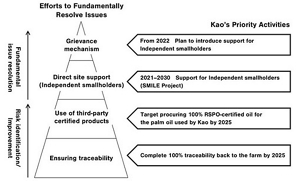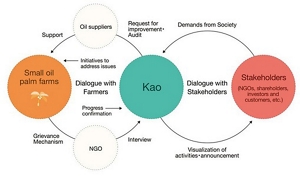“High-Risk” Supply Chain Management and Sourcing
We recognize that our business is dependent on natural capital, and strive to procure sustainable natural resources. In particular, we position palm oil, which is the main raw material in surfactants, and paper and pulp, which are used in packaging materials and diapers, as our most important natural resources (Reference: Kao |Using Eco-Friendly Plant Materials (kao.com)). This document establishes our conduct guidelines for the procurement of palm oil, paper and pulp, and describes our approach to resolving the fundamental issues.
Target
Palm oil: Palm oil, palm kernel oil and their derivatives used in the Kao Group
Paper and pulp: Paper, pulp and packaging materials used in Kao Group products
Principles for Action
-
We support the principles of NDPE Policy*1 and commit deforestation- and conversion-free (DCF) by 2025.
Kao require that all of our third-party suppliers and their corporate groups*2 have adopted the NDPE policies as an obligation thoroughly. We conduct procurement with suppliers that comply with the following. We periodically confirm the status of compliance, and conduct third-party audits (SMETA) of suppliers as necessary. We take action as appropriate when there is a compliance violation, including issuing guidance for improvements and suspending business transactions.- With regard to palm oil, the RSPO Principles and Criteria*3 are met. With regard to paper and pulp, criteria such as the FSC Principles and Criteria*4 are met.
- Preservation of biodiversity, high conservation value (HCV) forests, high carbon stock (HCS) forests and peatlands.
- Respect for human rights for all people involved in the supply chain (Reference: Kao Human Rights Policy (kao.com)). Respect for the rights of workers, indigenous peoples and local communities (including land rights), and guarantee of free, prior and informed consent (FPIC).
- Refusal to tolerate violence, criminalization or intimidation against human rights defenders in the supply chain (based on UN Guiding Principles on Business and Human Rights).
- As one method of effective monitoring and due diligence, we are collaborating with suppliers, plantations, NGOs and NPOs, third-party institutions and others to confirm zero deforestation at the source and establish traceability back to producing regions.
- In cooperation with suppliers, plantations, NGOs and NPOs, third-party institutions and various other stakeholders, we are identifying risks through on-site dialogue, assessing the fundamental issues and conducting activities to resolve them.
- We will work to reduce the quantity of raw materials we use and to switch to non-edible biomass sources..
Palm oil procurement initiatives
-
Achieve traceability back to the oil palm smallholder level:
We aim to complete 100% traceability back to oil palm smallholders by 2025. -
Transition to RSPO-Certified palm oil:
We aim to procure 100% RSPO-certified palm oil used by the Kao Group by 2025. -
Provide direct on-site assistance (through training programs):
We are providing assistance for independent oil palm smallholders in Indonesia from 2021 to 2030. -
Introduction of a Grievance Mechanism*5 :
We introduce a grievance mechanism for independent oil palm smallholders in Indonesia and announce the content and status of the response to grievances. -
Implementation of forest monitoring:
We implement monitoring of palm oil mills and their surrounding forests. We introduce forest footprint*6 evaluations. -
Collaboration with industry groups and various other stakeholders:
We conduct activities to gain understanding of site issues and realize widespread use of certified products through direct dialogue with industry groups and various other stakeholders.

Initiatives to procure sustainable palm oil

Overall image of support measures for small oil palm farms
Paper and pulp procurement initiatives
-
Achieve traceability back to the forest:
We maintain 100% traceability back to the forest. -
Transition to FSC-certified and other third-party certified products:
We aim to procure 100% certified products for the paper and pulp used in Kao products by 2025. -
Collaboration with suppliers and various other stakeholders:
We conduct activities to gain understanding of site issues and realize widespread use of certified products through direct dialogue with suppliers and various other stakeholders.
Implementation
- This document is revised corresponding to changes in social conditions and new findings, and with the approval of the Executive Officer in charge of purchasing.
- We verify progress toward our targets, and report this online and in the annually issued Sustainability Report.
-
*1NDPE: No-Deforestation, No-Peat and No-Exploitation. According to the AFi definition, deforestation refers to 1) conversion of natural forest to agriculture or other non-forest land use, 2) conversion of natural forest to a tree plantation, and 3) loss of natural forest due to severe and sustained degradation.
Definitions | Accountability Framework -
*2Corporate group: Corporate group as defined by the Accountability Framework initiative.
Definitions | Accountability Framework -
*3RSPO Principles and Criteria: Principles and Criteria for the Production of Sustainable Palm Oil
RSPO - Roundtable on Sustainable Palm Oil -
*4FSC Principles and Criteria: FSC Principles and Criteria for Forest Stewardship
About us | fsc.org -
*5Grievance Mechanism:
Guiding Principles On Business And Human Rights -
*6Forest Footprint: Total area of forests and peatlands affected by products with risk of forest destruction (forest risk commodities), including palm oil, paper and pulp and timber
April 17, 2025
Masakazu Negoro
Representative Director, Senior Managing Executive Officer
Kao Corporation
- Home
- Sustainability
- Making Thoughtful Choices for Society
- Responsibly Sourced Raw Materials
- “High-Risk” Supply Chain Management and Sourcing
- Home
- Sustainability
- Making Thoughtful Choices for Society
- Responsibly Sourced Raw Materials
- “High-Risk” Supply Chain Management and Sourcing
